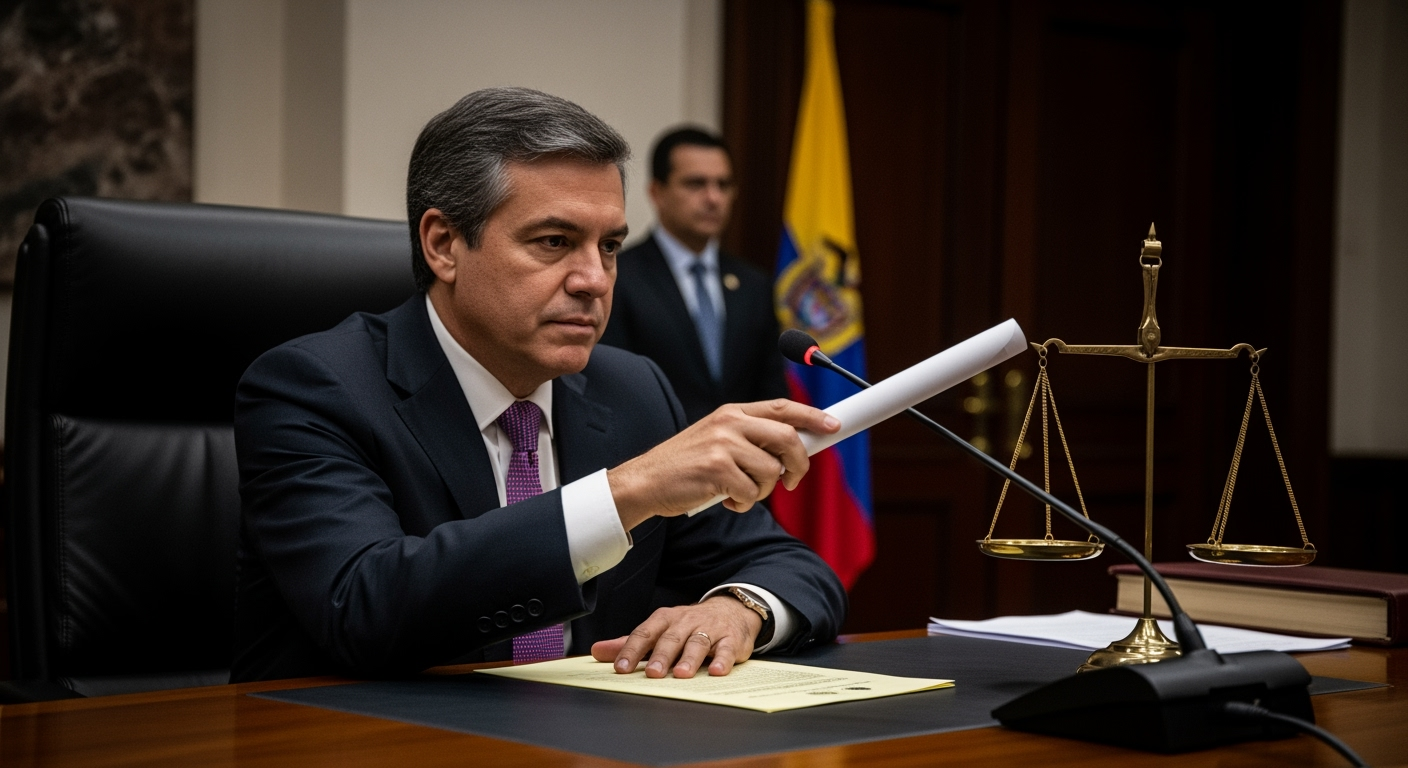Related Articles

North Korea Fires Ballistic Missile Eastward, Heightening Tensions Ahead of Asia-Pacific Summit




BOGOTÁ, Colombia – In a monumental decision that has sent reverberations across Colombia's complex political landscape, an appeals court on Tuesday, October 21, 2025, overturned the conviction of former President Álvaro Uribe Vélez for bribery and witness tampering. The ruling rescinds an earlier judgment that had sentenced the 73-year-old conservative strongman to 12 years of house arrest, a verdict that had marked the first time a former Colombian head of state faced such a criminal sentence. This latest development reignites a fiercely polarizing debate about justice, political power, and Uribe's enduring legacy in the South American nation.
The appeals court's decision, issued by the Bogotá Superior Court's Criminal Chamber, concluded that the initial conviction, handed down in August following a nearly six-month trial, suffered from "structural deficiencies," relied on "vague premises," and lacked a "comprehensive analysis" of the evidence presented. This pivotal judgment found that the lower court failed to adequately assess key evidence and that there was insufficient proof, whether physical, testimonial, or technical, to uphold a guilty verdict against the former president. The ruling specifically highlighted inconsistencies in key witness testimonies and criticized the original decision for lacking objectivity and demonstrating argumentative bias. Two of the three judges on the appeals panel voted to overturn the conviction, with one judge dissenting.
The legal saga, which has captivated and divided Colombia for years, stems from allegations that Uribe attempted to influence witnesses who had accused him of having ties to a paramilitary group during the 1990s. Uribe, who served as president from 2002 to 2010, consistently maintained his innocence, asserting that the charges constituted political persecution and that the presiding judge harbored bias against him. His legal team argued that the prosecution had not "unequivocally" proven his responsibility in the alleged crimes.
The convoluted case began in 2012 when Uribe filed a complaint against leftist Senator Iván Cepeda, accusing him of slander. Senator Cepeda had been conducting an investigation into Uribe's alleged connections to right-wing paramilitary groups, a period marked by intense violence in Colombia. In a significant turning point in 2018, the Supreme Court of Justice dismissed Uribe's complaint against Cepeda. In a "bombshell reversal," the Supreme Court then initiated its own probe into Uribe, who was at the time a senator, for fraud and witness tampering.
The case's trajectory saw a crucial shift in August 2020 when the Supreme Court ordered Uribe's house arrest as part of its investigation. Shortly thereafter, Uribe resigned from his Senate seat, a move that effectively transferred jurisdiction of the case from the Supreme Court (which has the authority to investigate lawmakers) to the Prosecutor's Office. This change in jurisdiction led to significant delays and attempts by prosecutors to close the case, citing a lack of sufficient evidence.
However, the investigation was ultimately revived under the tenure of Attorney General Luz Camargo, an appointee of current President Gustavo Petro. The original trial, which opened in May 2024, involved testimony from over 90 witnesses, including at least one former fighter who claimed Uribe attempted to influence his account. Furthermore, Uribe's former lawyer, Diego Cadena, had been sentenced to seven years for similar offenses, complicating Uribe's defense. The appeals court's decision to annul controversial wiretaps of Uribe's conversations with Cadena proved central to the reversal, underscoring the court's finding of procedural and evidentiary flaws in the initial conviction.
The overturning of Uribe's conviction carries profound implications for Colombia's political landscape, particularly as the nation gears up for legislative and presidential elections next year. Uribe remains a highly influential and polarizing figure, commanding a significant base of support through his Democratic Center party. His supporters often credit him with rescuing Colombia from the brink of becoming a failed state, while critics associate him with alleged human rights violations and the rise of paramilitary groups during the 1990s.
The original 12-year sentence had included an 8-year ban on holding public office. With the conviction now overturned, his party has indicated that Uribe may consider running for senator, should his legal status permit. This latest judicial outcome is seen as a significant boost for Uribe and his political movement, reinforcing the narrative among his followers that the previous prosecution was politically motivated. Conversely, for the opposition and critics, the case has represented a critical test of whether even the most powerful figures in Colombia are held accountable under the law.
The legal battle is not definitively over. Colombian law allows prosecutors and victims to appeal Tuesday's ruling to the Supreme Court of Justice. This cassation process, a final review for legal errors, could potentially extend for up to five more years, prolonging a chapter that has deeply entrenched the relationship between justice and power in the national discourse. The verdict underscores the persistent fragility of judicial processes involving high-profile political figures and the inherent challenges in achieving definitive legal outcomes in a nation still grappling with its violent past.